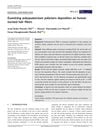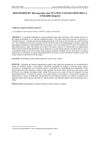 4 citations,
November 2017 in “Journal of Cosmetic Dermatology”
4 citations,
November 2017 in “Journal of Cosmetic Dermatology” Certain polymers can stick to hair and increase volume, working best at a pH of 7 to 9.
 4 citations,
January 2016 in “Postepy Dermatologii I Alergologii”
4 citations,
January 2016 in “Postepy Dermatologii I Alergologii” Many hair diseases, including those caused by medications and psychological issues, can lead to hair loss and require proper treatment and specialist care.
 4 citations,
September 2014 in “Elsevier eBooks”
4 citations,
September 2014 in “Elsevier eBooks” Use some skin medications with caution during pregnancy; avoid strong steroids, certain eczema treatments, and systemic retinoids, but many topical treatments and nasal sprays are safe.
 4 citations,
August 2010 in “Journal of the American Academy of Dermatology”
4 citations,
August 2010 in “Journal of the American Academy of Dermatology” Cicatricial alopecia involves scarring hair loss and can be treated with various medications.
 4 citations,
December 2009 in “Current Medical Research and Opinion”
4 citations,
December 2009 in “Current Medical Research and Opinion” Dermatologists are more comfortable and proactive in treating male pattern hair loss than primary care physicians.
 4 citations,
May 2007 in “Journal of Dispersion Science and Technology”
4 citations,
May 2007 in “Journal of Dispersion Science and Technology” Hinokitiol in cationic vesicles promotes hair growth better due to higher skin retention.
 3 citations,
September 2020 in “Journal of cosmetic dermatology”
3 citations,
September 2020 in “Journal of cosmetic dermatology” Coconut oil makes hair stronger and more flexible than mineral oil.
 3 citations,
November 1999 in “Journal of Cutaneous Medicine and Surgery”
3 citations,
November 1999 in “Journal of Cutaneous Medicine and Surgery” AGA is a genetic, hormonal hair loss treated with finasteride, minoxidil, and supplements, but new compounds are being developed.
 3 citations,
May 2021 in “Dermatologic Clinics”
3 citations,
May 2021 in “Dermatologic Clinics” The document concludes that more research is needed to understand hair loss in men and to find new treatments.
 3 citations,
April 2019 in “Journal of Dermatological Treatment”
3 citations,
April 2019 in “Journal of Dermatological Treatment” Caffeine shows promise for treating some types of hair loss, but more research is needed.
 3 citations,
April 2018 in “Cosmetics”
3 citations,
April 2018 in “Cosmetics” As people get older, they have less active hair growth, but women have thicker hair than men and respond better to hair loss treatments.
 3 citations,
January 2018 in “Open Access Macedonian Journal of Medical Sciences”
3 citations,
January 2018 in “Open Access Macedonian Journal of Medical Sciences” Implant safely and effectively treats hair loss.
 3 citations,
July 2017 in “Current sports medicine reports”
3 citations,
July 2017 in “Current sports medicine reports” Athletes can experience various skin issues, which can be treated and prevented with appropriate care and protective measures.
 3 citations,
January 2016 in “Journal of cosmetology & trichology”
3 citations,
January 2016 in “Journal of cosmetology & trichology” Taking vitamins, minerals, and amino acids can improve hair strength and quality in people with Monilethrix.
 3 citations,
December 2015 in “Acta Veterinaria Brasilica”
3 citations,
December 2015 in “Acta Veterinaria Brasilica” A chinchilla got ringworm from stress and contact with dog-related items.
 3 citations,
January 2005 in “Media Asia”
3 citations,
January 2005 in “Media Asia” Advertising in China shifted towards entertainment, favored local brands, and played a significant role in the country's move to a consumer economy.
 3 citations,
June 2004 in “Alternative and Complementary Therapies”
3 citations,
June 2004 in “Alternative and Complementary Therapies” The document concludes that hair loss is influenced by genetics and other factors, and while treatments like finasteride can help, they have limitations and side effects.
 2 citations,
September 2019 in “South Asian research journal of pharmaceutical sciences”
2 citations,
September 2019 in “South Asian research journal of pharmaceutical sciences” Heavy metals in personal care products can cause serious health issues like cancer and hair loss.
 2 citations,
January 2014 in “Springer eBooks”
2 citations,
January 2014 in “Springer eBooks” The book details skin conditions in older adults, their link to mental health, cancer treatment importance, hair loss remedies, and managing autoimmune and itchy skin.
 2 citations,
September 2013 in “Journal of Cosmetic Dermatology”
2 citations,
September 2013 in “Journal of Cosmetic Dermatology” Hair restoration combines drugs and follicular unit grafting for natural, long-lasting results.
 2 citations,
June 2012 in “Journal of Cosmetic Dermatology”
2 citations,
June 2012 in “Journal of Cosmetic Dermatology” Hair transplant using beard hair made acne scars on cheeks less visible with minimal scarring in the donor area.
 2 citations,
July 2008 in “Dermatologic Surgery”
2 citations,
July 2008 in “Dermatologic Surgery” The Cross-section Trichometer is a promising tool for measuring hair characteristics without cutting the hair and may have various clinical uses.
 2 citations,
May 2001 in “Current problems in dermatology”
2 citations,
May 2001 in “Current problems in dermatology” The conclusion is that effectively treating hair disorders is difficult due to the complex factors affecting hair growth and more research is needed to improve treatments.
 2 citations,
July 2018 in “Elsevier eBooks”
2 citations,
July 2018 in “Elsevier eBooks” Some supplements may help with hair loss, but there's not enough strong evidence to recommend them without doctor advice.
 2 citations,
November 2017 in “Food Additives & Contaminants: Part A”
2 citations,
November 2017 in “Food Additives & Contaminants: Part A” The new method accurately detects illegal hair-growth drugs in dietary supplements.
 2 citations,
August 2010 in “Journal of the American Academy of Dermatology”
2 citations,
August 2010 in “Journal of the American Academy of Dermatology” A 65-year-old woman has a growing bald spot on her scalp.
 2 citations,
December 2007 in “Expert Review of Dermatology”
2 citations,
December 2007 in “Expert Review of Dermatology” The document concludes that early diagnosis and treatment are key for pediatric hair loss disorders, and addressing the emotional effects on children is important.
 2 citations,
December 2004 in “Medicine”
2 citations,
December 2004 in “Medicine” Different hair and scalp disorders cause hair loss or excess hair growth, with various treatments available depending on the specific condition.
 2 citations,
June 2000 in “Journal of Oral and Maxillofacial Surgery”
2 citations,
June 2000 in “Journal of Oral and Maxillofacial Surgery” Hair transplantation techniques have improved over time, leading to natural-looking results and high graft survival rates, making it a popular treatment for hair loss.
 2 citations,
October 1997 in “Dermatologic Clinics”
2 citations,
October 1997 in “Dermatologic Clinics” The document concludes that advancements in hair restoration surgery have led to more natural results and patient satisfaction, with hope for future improvements in treatment.






























